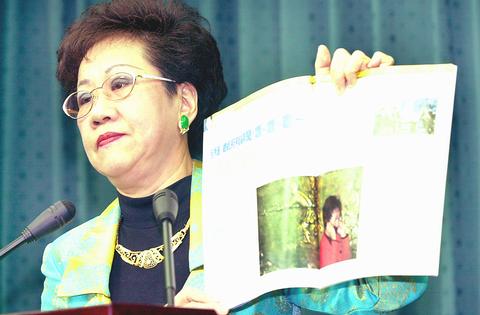The Taipei District Court (
However, Judge Lai Yung-hua's (
The dispute between The Journalist and Lu erupted in November 2000 when the magazine published a story accusing Lu of spreading a rumor that Chen was having an affair with one of his female aides. The magazine said Lu spread the rumor in order to unseat Chen.

PHOTO: GEORGE TSORNG, TAIPEI TIMES
Lu filed a civil suit on Dec. 21, 2000, demanding a formal apology from the magazine, saying the story had injured her reputation.
In addition to Yang, the lawsuit named as defendants The Journalist president Wang Chien-chuang (王健壯), executive president Jan Hung-chi (詹宏志), publisher Wang Hsing-ching (王杏慶) and reporters Yang Shu-mei (楊舒媚), Wu Yan-ling (吳燕玲) and Tao Ling-yu (陶令瑜).
In his verdict, Judge Lai acknowledged that Yang had lied about Lu calling him and telling him about the alleged affair and that he had also lied about having witnesses to back up the magazine's story.
However, Lai said the magazine was protected by the press freedom guaranteed by the Council of Grand Justices' constitutional Interpretation Number 509, which allows the press to propose proper questions about any suspicious fact or person. Therefore, he ruled that Yang was not guilty of libel.
Yang testified that Lu had called him on Nov. 13, 2000 and said that the president was having an affair. Yang said he had then told reporters Yang Shu-mei, Wu and Tao about the phone call and directed them to write about it.
In pre-trial hearings, Yang told the judge that Chen Shih-ning (
As for the other defendants, Lai ruled Wang Chien-chuang was not guilty because he was only in charge of administrative duties and had nothing to do with the magazine's stories. Jan was found not guilty because his title was simply an honorary one and he was not really working for the magazine. Wang Hsing-ching was found not guilty because his duties did not include editing the stories about Lu.
The three reporters were found innocent because the judge ruled they were only following orders in writing stories assigned to them by Yang.
However, Lai ruled that the story about Lu had damaged her reputation -- therefore, according to Article 188-1 of the Civil Code, Yang must "clarify and admit" his mistake. Lai ordered Yang to publish a clarification on the front pages of Taiwan's major newspapers as well as broadcast it on the radio and TV for three days.
"The case was about human dignity and press freedom," said Lai. "The court understood the defendants' jobs as media workers but we also considered Lu's reputation's as being damaged."
Lu claimed victory yesterday.
"The truth is the truth," Lu said. "No matter how Wang tried to argue and explain, he couldn't beat the truth."
She added that she appreciated the president's trust in her over this case.
Wang Chien-chuang said The Journalist actually won the suit.
"Why were those charges against the rest of us dropped?" said Wang. "That means we were always telling the truth. We will discuss an appeal on Yang's behalf with our lawyers."

MORE VISITORS: The Tourism Administration said that it is seeing positive prospects in its efforts to expand the tourism market in North America and Europe Taiwan has been ranked as the cheapest place in the world to travel to this year, based on a list recommended by NerdWallet. The San Francisco-based personal finance company said that Taiwan topped the list of 16 nations it chose for budget travelers because US tourists do not need visas and travelers can easily have a good meal for less than US$10. A bus ride in Taipei costs just under US$0.50, while subway rides start at US$0.60, the firm said, adding that public transportation in Taiwan is easy to navigate. The firm also called Taiwan a “food lover’s paradise,” citing inexpensive breakfast stalls

US PUBLICATION: The results indicated a change in attitude after a 2023 survey showed 55 percent supported full-scale war to achieve unification, the report said More than half of Chinese were against the use of force to unify with Taiwan under any circumstances, a survey conducted by the Atlanta, Georgia-based Carter Center and Emory University found. The survey results, which were released on Wednesday in a report titled “Sovereignty, Security, & US-China Relations: Chinese Public Opinion,” showed that 55.1 percent of respondents agreed or somewhat agreed that “the Taiwan problem should not be resolved using force under any circumstances,” while 24.5 percent “strongly” or “somewhat” disagreed with the statement. The results indicated a change in attitude after a survey published in “Assessing Public Support for (Non)Peaceful Unification

PLUGGING HOLES: The amendments would bring the legislation in line with systems found in other countries such as Japan and the US, Legislator Chen Kuan-ting said Democratic Progressive Party (DPP) Legislator Chen Kuan-ting (陳冠廷) has proposed amending national security legislation amid a spate of espionage cases. Potential gaps in security vetting procedures for personnel with access to sensitive information prompted him to propose the amendments, which would introduce changes to Article 14 of the Classified National Security Information Protection Act (國家機密保護法), Chen said yesterday. The proposal, which aims to enhance interagency vetting procedures and reduce the risk of classified information leaks, would establish a comprehensive security clearance system in Taiwan, he said. The amendment would require character and loyalty checks for civil servants and intelligence personnel prior to

The China Coast Guard has seized control of a disputed reef near a major Philippine military outpost in the South China Sea, Beijing’s state media said, adding to longstanding territorial tensions with Manila. Beijing claims sovereignty over almost all of the South China Sea and has waved away competing assertions from other countries as well as an international ruling that its position has no legal basis. China and the Philippines have engaged in months of confrontations in the contested waters, and Manila is taking part in sweeping joint military drills with the US which Beijing has slammed as destabilizing. The Chinese coast guard